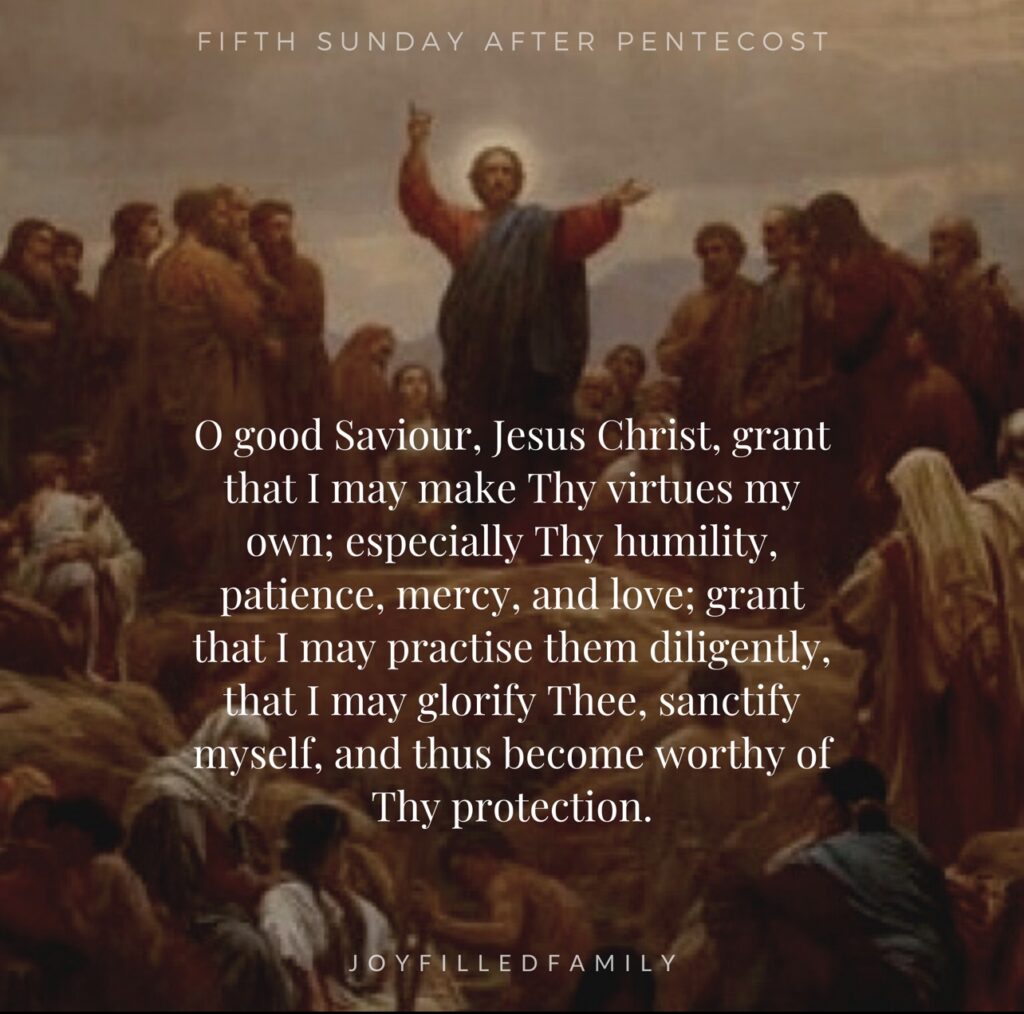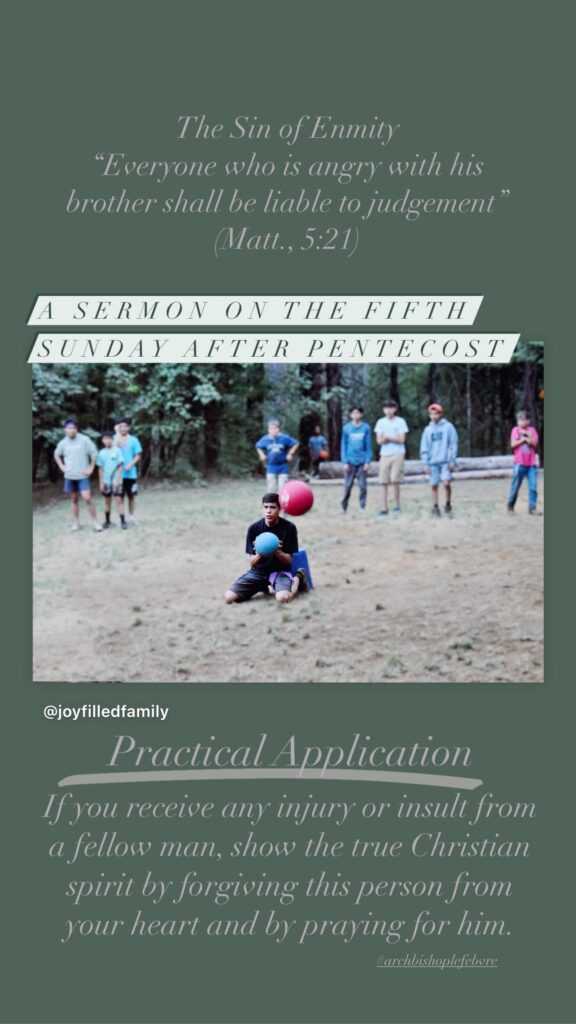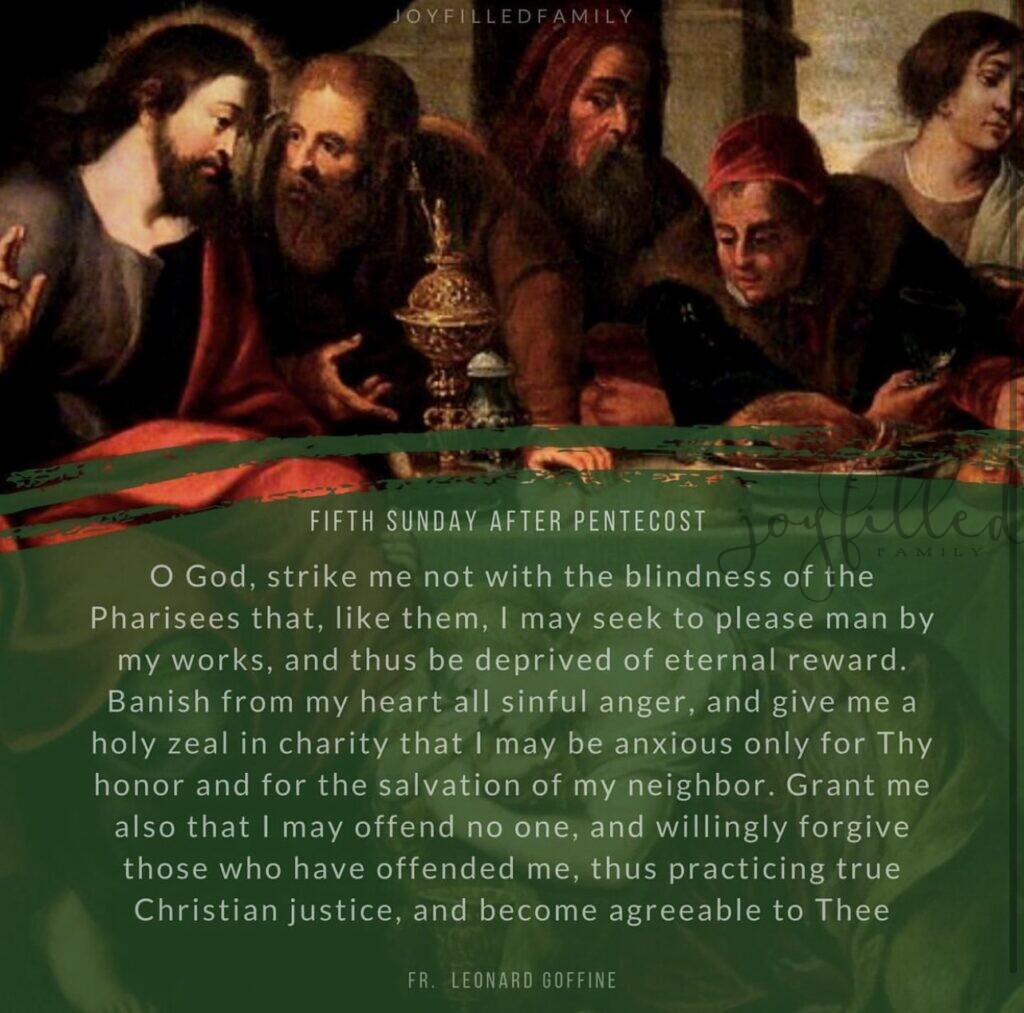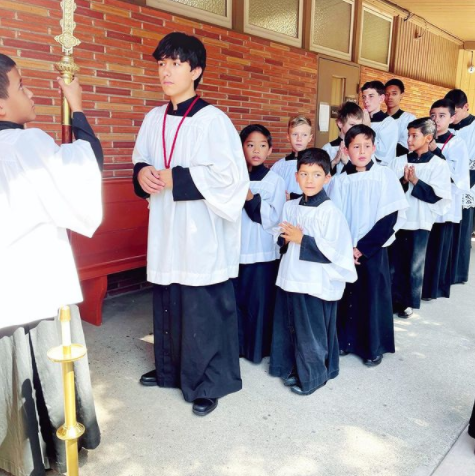INSTRUCTION ON THE FIFTH SUNDAY AFTER PENTECOST

At the Introit implore God’s assistance and say, with the priest:
INTROIT Hear, O Lord, my voice with which I have cried to thee: be thou my helper, forsake me not, nor do Thou despise me, O god, my Savior. (Ps. XXVI.) The Lord is my light and my salvation; whom shall I fear? Glory be to the Father, etc.
COLLECT O God, who host prepared invisible good things for those that love Thee: pour into our hearts such a sense of Thy love, that we, loving Thee in all, and above all, may obtain Thy promises, which exceed all out desire: Through etc.
EPISTLE (I Peter III. 8-15.) Dearly beloved, Be ye all of one mind, having compassion one of another, being lovers of the brotherhood, merciful, modest, humble: not rendering evil for evil, nor railing for railing, but contrariwise, blessing: for unto this you are called; that you may inherit a blessing. For he that will love life, and see good days, let him refrain his tongue from evil, and his lips that they speak no guile. Let him decline from evil, and do good: let him seek?after peace, and, pursue it: because the eyes of the Lord are upon the just, and his ears unto their. prayers: but the countenance of the Lord upon them that do evil, things. And, who is he that can, hurt you, if you: be zealous of good? But if also you suffer any thing for, justice’ sake, blessed are ye. And be not afraid of their fear, and be not troubled: but sanctify the Lord Christ, in your hearts.
How can and how should we sanctify the Lord in our hearts?
By practising those virtues which Peter here recommends, and which he so exactly describes; for thereby we become true disciples of Christ, honor Him and edify others, who by our good example are led to admire Christianity, and to become His followers. Moreover, we thus render ourselves more worthy of God’s grace and protection, so that if for justice’ sake we are persecuted by, wicked men, we need not fear, because God is for us and will reward us with eternal happiness.
ASPIRATION O good Saviour, Jesus Christ, grant that I may make Thy virtues my own; especially Thy humility, patience, mercy, and love; grant that I may practise them diligently, that I may glorify Thee, sanctify myself, and thus become worthy of Thy protection.
GOSPEL (Matt. V. 20-24.) At that time, Jesus said to his disciples: Except your justice abound more than that of the Scribesand Pharisees, you shall not enter into the kingdom of heaven. You have heard that it was said to them of old: Thou shalt not kill: and whosoever shall kill, shall be in danger of the judgment. But I say to you, that whosoever is angry with his brother, shall be in danger of the judgment. And whosoever shall say to his brother, Raca, shall be in danger of the council. And whosoever shall say, Thou fool, shall be in danger of hell fire. If therefore, thou bring thy gift at the altar, and there thou remember that thy brother bath anything against thee, leave there thy offering befog a the altar, and go first to be reconciled to thy brother: and then coming, thou shaft offer thy gift.
In what did the justice of the Pharisees consist?
In external works of piety, in the avoidance of such gross vices as could not be concealed, and would have brought them to shame and disgrace. But in their hearts these Pharisees cherished evil, corrupt inclinations and desires, pride, envy, avarice, and studied malice and vengeance. Jesus, therefore, called them hypocrites, whitened sepulchres, and St. John calls them a brood of vipers. True Justice consists not only in external works of piety, that is, devotional works, but especially in a pure, sincere, self sacrificing feeling towards God and man; without this all works, however good, are only a shell without a kernel.
How are we to understand that which Christ here says of anger and abusive words?
The meaning of Christ’s words are:. You have heard that murder was forbidden to your fathers in the desert, and that the murderer had to be given up to justice: but I say to you, whoever becomes angry with his neighbor, shall be in danger of divine judgment, and he who with abusive words, such as Raca, Villain, gives vent to his anger, using expressions of contempt and insult, as fool, scoundrel, profligate, wretch, is more liable to punishment. These degrees of anger are punished in different ways by God.
Is anger always sinful?
No, anger is sinful only when we wish or actually inflict some evil to the body, property, or honor of our neighbor; when we make use of such insulting and abusive words as injure his character, provoke and irritate him. If we become angry at the vices and crimes of others, when our office or the duties of our station demand that we watch over the conduct of those under our care, to punish and correct them, (as in the case of parents, teachers, and superiors) then anger is no sin. When one through pure love of God, becomes irritated at the sins and vices of his fellowmen, like King David, or if one urged to wrong, repels the tempter with indignation, this is even a holy anger. Thus St. Gregory Says; “It is to be understood that anger created by impatience is a very different thing from anger produced by a zeal for justice. The one is caused by vice, the other by virtue.” He, then, who becomes angry for justice’ sake, commits no sin, but his conduct is holy and praiseworthy, for even our Lord was angry at those who bought and sold in the temple, (John II. 15.) Paul at the magician Elymas, (Acts XIII. 8.) and Peter at the deceit of Ananias and Saphira. (Acts V. 3.) Anger, then, to be without sin, must proceed from true zeal for God’s honor and the salvation of souls, by which we seek to prevent others from sin, and to make them better. Even in this respect, we must be careful to allow our anger no control over our reason, but to use it merely as a means of doing good, for we are often apt to take the sting of anger for holy zeal, when it is really nothing but egotism and ambition.
Why must we first be reconciled with our neighbor before bringing an offering to God, or undertaking any good work?
Because no offering or other good work can be pleasing to God, while we live in enmity, hatred, and strife with our neighbor; for by living thus we act altogether contrary to God’s will. This should be remembered by all Christians, who go to confession and holy Communion, without forgiving those who have offended them, and asking pardon of those whom they have injured. These must know that instead of receiving absolution for their sins, they by an invalid confession are guilty of another sin, and eat their own judgment in holy Communion.
How should reconciliation be made with our neighbor?
With promptness, because the apostle says: Let not the sun go down upon your anger. (Eph. IV. 26.) But if the person you have offended is absent, says St. Augustine, and you cannot easily meet him, you are bound to be reconciled to him interiorly, that is, to humble yourself before God, and ask His forgiveness, making the firm resolution to be reconciled to your enemy as soon as possible. If he is accessible, go to him, and ask his forgiveness; if he has offended you, forgive him from your heart. The reconciliation should be sincere, for God sees into the heart; it should also be permanent, for if it is not lasting, it may be questioned if it was ever sincere. On account of this command of Christ to be reconciled to our enemies before bringing sacrifice, it was the custom in ancient times that the faithful gave. the kiss of peace to one another at the sacrifice of Mass, before Communion, as even to this day do the priests and deacons, by which those who are present, are admonished to love one another with holy love, and to be perfectly reconciled with their enemies, before Communion.
ASPIRATION O God, strike me not with the blindness of the Pharisees that, like them, I may seek to please man by my works, and thus be deprived of eternal reward. Banish from my heart all sinful anger, and give me a holy zeal in charity that I may be anxious only for Thy honor and for the salvation of my neighbor. Grant me also that I may offend no one, and willingly forgive those who have offended me, thus practicing true Christian justice, and become agreeable to Thee.
MEANS OF PREVENTING ANGER
The first and most effectual preventive is humility; for as among the proud there are always quarrels and contentions, (Prov. XIII. 10.) so among the humble reign peace, meekness and patience. To be humble, meek, and patient, we must frequently bring before our minds the example of Christ who did not sin, neither was guile found in His mouth, (I Peter II. 22.) yet suffered great contradictions, many persecutions, scoffs and sneers from sinners, without threatening vengeance to any one for all He suffered; He say’s to us in truth: Learn of me, because I am meek and humble of heart. (Matt. XI. Z9.) A very good preventive of anger is to think over in the morning what causes will be likely to draw us into anger at any time during the day, and to arm ourselves against it by a firm resolution to bear all with patience and silence; and when afterwards anything unpleasant occurs, let us think, “What will I effect by my anger? Can I thereby make things better? Will I not even make myself ridiculous and injure my health?” (for experience as well as holy Scripture teaches, that anger shortens life.) (Eccles. XXX. 26.) Finally, the most necessary preventive of anger is fervent prayer to God for the grace of meekness and patience, for although it seems difficult and almost impossible to our nature to be patient, by the grace of God it becomes not only possible, but even easy.
INSTRUCTION ON SACRIFICE
Offer thy gift. (Matt. V. 24.)
In its wider and more universal sense sacrifice comprehends all religious actions by which a rational being; presents himself to God, to be united with Him; and in this sense prayer, praising God, a contrite heart, charity to others, every good work, and observance of God’s commandments is a sacrifice. Thus the Holy Scriptures say: Offer up the sacrifice of justice and trust in the Lord. (Fs. IV. 6.) Offer to God the sacrifice of praise. (Ps. XLIX. iq..) Sacrifice to God is an afflicted spirit; a contrite and humble heart, O God, thou wilt not despise. (Ps. 1. 19.) It is a wholesome sacrifice to take heed to the commandments, and to depart from, all iniquity. (Ecclus. XXXV. 2.) “Therefore,” says St. Augustine, “every good work which is united in sanctity with God, is a true sacrifice, because it refers to the end of all good, to God, by whom we can be truly happy.” As often, then, as you humble yourself in prayer before the majesty of God, when you give yourself up to God, and when you make your will subject to His divine will, you bring a sacrifice to God; as often as you punish your body by continency, and your senses by mortification, you bring a sacrifice to God, because you offer them as instruments of justice; (Rom. VI. 13.) as often as you subdue the evil concupiscence of the flesh, the perverted inclinations of your soul, deny yourself any worldly pleasure for the love of God, you bring a sacrifice to God. Such sacrifices you should daily offer to God; without which all others have no value and do not please God, such as these you can make every moment, when you think, speak, and act all for the love, of God.Strive then, Christian soul, to offer these pleasing sacrifices to God, the supreme Lord, and as you thus glorify Him, so will He one day reward you with unutterable glory.
Fifth Sunday after Pentecost
The Sin of Enmity
“Everyone who is angry with his brother shall be liable to judgement”
(Matt., 5:21)

The moral law proclaimed by Jesus Christ is based on the commandment of love: “Thou shall love the Lord thy God with thy whole heart and soul… Thou shalt love thy neighbour as thyself.” Hence, it is a serious sin to disobey this commandment, not only with reference to the obligation to love God but also with reference to the obligation to love one’s neighbour. This is the significance of Our Lord’s words in today’s Gospel: “Everyone who is angry with his brother shall be liable to judgement.”
Of course, these words must be interpreted properly. Our Lord does not condemn just anger.
He Himself manifested just anger when He drove the buyers and sellers out of the temple. If some modern parents were more inclined to show just anger toward their children when they misbehave, there would be less juvenile delinquency in our country. Again, that type of anger which consists in a brief manifestation of impatience or a slight show of temper which is uncalled for is not a serious sin, though people should strive to restrain this also.
But the type of anger toward our fellow men which Christ condemned so severely is that which consists in lasting, deep hatred. It is most unfortunate that many persons yield to this form of anger, which we call enmity. There are cases of enmity that lasts for years–sometimes between near relatives. People who meet daily hate each other so viciously that they will speak only in so far as is strictly necessary. They will strive to do each other harm, they will rejoice in each other’s misfortunes. How can such persons call themselves Christians, followers of the gentle and forgiving Jesus Christ? How can they say with sincerity: “Forgive us our trespasses as we forgive those who trespass against us?”
It is only natural that at times we should feel a sense of resentment when we are treated unkindly or unjustly by others, and we are not forbidden to manifest our feelings and demand our just rights. But this must be done without hatred of soul. When there is reason to believe that the person who offended us was not aware of what he was doing, we should be sufficiently magnanimous to forget the matter. Often the source of the resentment that divides people for years is a slight incident, not sufficiently important to arouse good Christians to a single burst of impatience.
Practical Application
If you receive any injury or insult from a fellow man, show the true Christian spirit by forgiving this person from your heart and by praying for him.

Liturgy: Fifth Sunday after Pentecost – Be Reconciled to Thy Brother

“If thou offer thy gift at the altar, and thou remember that thy brother hath anything against thee, leave there thy offering before the altar, and go first to be reconciled to thy brother, and then coming thou shall offer thy gift, alleluia”
This Sunday’s liturgy is concerned with the forgiveness of injuries, with brotherly reconciliation. It takes its cue from a passage of one of the epistles of St. Peter the Apostle, whose feast is kept this month, and from a portion of the Sermon on the Mount, recorded in St. Matthew’s Gospel.
Jesus condemns not only the external act of murder, but also the interior motive of anger which leads us to it, for in this is the desire of ridding ourselves of our neighbor. “This anger has three degrees,” says St. Augustine. The first is when one retains in the heart the disturbance that has been created there (Postcommunion), the second when one expresses his indignation, and thirdly, when one openly reviles him who caused it (Epistle). Corresponding to these three degrees are three punishments of an increasingly grave character. “The true sacrifice is reconciliation with our brother,” says St. John Chrysostom. “The first sacrifice necessary to offer to God,” adds Bossuet, “is a heart free from all coldness and unfriendliness towards one’s brother” (Meditations, 14th day).
The best way to come to the possession of charity is to love God, to desire the good things of eternity (Collect) and the possession of happiness in heavenly places, where entrance is only to be had through the continual practice of this fair virtue. “One thing have I asked of the Lord, and this will I seek after; that I may dwell in the house of the Lord all the days of my life” (Communion).



